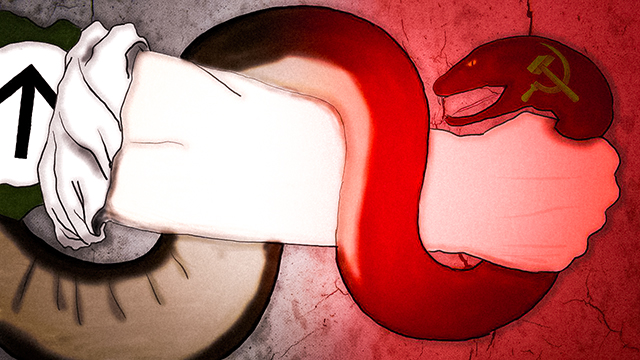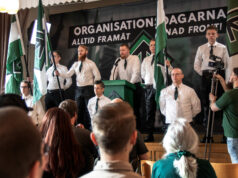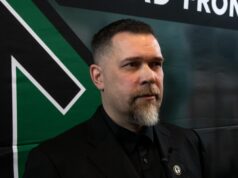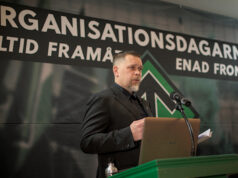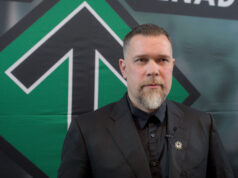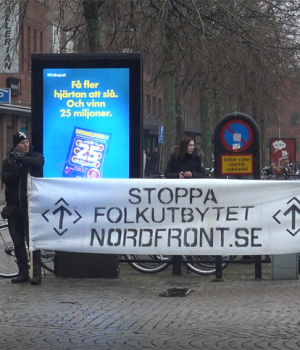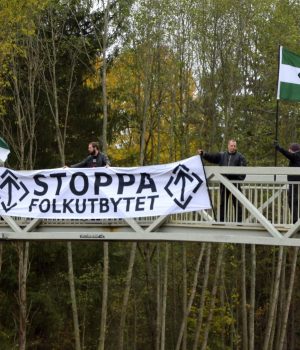GUEST WRITER. Fellow Icelandic comrade Arnar writes about his impressions of Mein Kampf and the struggle between Marxism and National Socialism. This is part 2 of 2.
“Up until 1920 there was no flag that opposed Marxism, at least not one which would have represented its direct opposite as a World-Concept…”
-Adolf Hitler
Even though internationalist Marxism is both false and criminal in its nature, it is successful because it faces only weak, disunited, and disorganized resistance on the right. Adolf Hitler writes:
The Marxist World-Concept, which is led by a unified head organization, faces a jumble of opposing views which makes little impression on the enemy’s united front. Victory cannot be achieved by such weak weapons. Only when the international World-Concept that is politically led by organized Marxism is opposed by a race-based concept that is equally unified and equally organized and equally well led, will these two camps meet on even ground, and that is when victory will stand with the camp that has eternal truth on its side.
In the face of a politically well-organized World-Concept like Marxism, resistance that is timid and defensive, that tries to adhere to the rules of the existing order, that tries to maintain its respectability, is bound to lose. It has to be equally bold and on the offensive:
At a time when one side, armed with all the weapons of a World-Concept, even though it is absolutely criminal, prepares for the attack on an existing order, the other side can successfully resist only if it covers itself in the form of a new, and in our case political, faith, and exchanges the catchwords of a weak and cowardly defence for the battle-cry of a bold and brutal attack.
No real resistance against the advance of organized Marxism can be expected from the existing political parties. They are comfortable with the system and will not change voluntarily. In fact, change “is impossible because they are being directed by Jews, Jews here and Jews there and Jews everywhere.” Hitler adds:
If current events are allowed to develop unhindered, the final result will be the realization of the Pan-Jewish prophecy, and the Jew would devour the peoples of the earth and become their master. […] A party led by [the Jew] can fight for only Jewish interests, and these have nothing in common with the needs of the Aryan.
Hitler foresaw that there would be a great inertia against change from those with an interest in the present system and he feared that the National Socialist party would also succumb to that fate, that it would become comfortable with the democratic system and become one party among many. What the young National Socialist movement needed was something comparable to the zeal of early Christianity:
Christianity could never be content with building its own altar. It was driven to destroy pagan altars. The faith could only grow when there was no controversy, and it did grow out of this fanatical intolerance. In fact, intolerance is absolutely indispensable for the growth of any faith.
National Socialism is not prepared to share its place with another world-concept. It only partakes in the democratic parliamentary process in order to destroy it. It can never support a regime or state of affairs that it condemns and intends to destroy, “it feels obligated to fight the current state-of affairs and the entire world of hostile ideas belonging to that order by every means possible until it achieves the enemy’s downfall.” Hitler emphasizes that there can be no controversy. There must be no freedom to interpret the doctrine. It has to be fixed and absolute. It must demand absolute loyalty from the members of the movement.
A World-Concept doctrine cannot fight and win if it allows the unlimited freedom for anyone to interpret its meaning. It can only fight and win if it is clearly defined in the limited and consolidated form of a political Organization.
The world-concept can only lead its ideas to victory if it manages to unite the best people of its time “into a vigorous fighting organization.” Because not everyone is a philosopher, certain core ideas from the world-concept have to be used as the basis for a confession so that they are more easily grasped by the members of the movement. This is also to underscore that the core ideas are not open for discussion. In Hitler’s own words, they are to be “wrapped up in brief, precise, slogan-like qualities that make them suitable as a doctrine of faith for a new fellowship of men.”
National Socialism, or the racialist world-concept, “recognizes the importance of the racial component of humanity. In principle, it sees the state only as a means to an end and its end is the preservation of the racial existence of mankind.” It hardly needs to be said today that this doctrine does not proclaim all races to be equal, but Hitler still felt the need to say that. That was probably in response to accusations from the monarchist or traditionalist right, which gets its share of scolding in Mein Kampf. It must be kept in mind that nationalism itself originated as a left-wing movement in Europe, when the right supported the monarchical and aristocratic system. According to Hitler, the inequality between the races also entails the inequality between individuals:
In principle, it acknowledges the aristocratic idea of Nature and believes in this law’s authority down to the last individual creature. Racialism recognizes that races have different values and there are different values of individual men.
Hitler calls the race-based world-concept an obligation to honor the “universal Will of Nature that rules the universe.” To honor it “results in the organizing force of racialism and not the disorganizing force of Marxism.”
The highest ideals of mankind are, according to Hitler, intrinsically bound to one race in particular, the Aryan race. He writes:
Human culture and civilization on this planet are inseparable from the existence of the Aryan. His extinction or downfall would bring the barbaric uncivilized ages on the globe once more. In the eyes of any race-based World-Concept, undermining of the existence of human culture by destroying the one group that sustains it, is the most repulsive crime possible.
Thus, the doctrine of Marxism is an enemy of mankind since it seeks to do away with the one race that is capable of maintaining human culture and civilization, whereas the race-based concept is in harmony with “the profound will of nature.”
But even though a world-concept is totally correct and in agreement with the eternal will of nature, it cannot be successful unless it is clearly defined and understood, and represented by a political party whose members are willing to give their own lives for the idea. Hitler writes:
Even a World-Concept that is totally sound and of the utmost value for humanity will never have any practical value and will never shape the people’s lives until its principles have become the banner of a fighting movement. […] General concepts must be moulded into a political program, a general World-Concept into a definite political faith.
The aim of the movement is success in the real world, so the political faith must not only serve the ideal, but it must include the means necessary to fight and win victory. This means that the program maker who declared the intellectual idea must be joined by a politician who has enough practical insight to shape the idea into an achievable plan (unless of course they are one and the same man). Hitler does not fall into the trap of useless high-minded idealism:
An eternal ideal that is the guiding star of humanity must adjust itself so that it takes into account the weaknesses inherent in man because of general human imperfection, and only then can it avoid failure the instant it begins.
The founder of the idea needs someone who knows the spirit and temper of the people and is able to impart a clear understanding of the basics of the idea and inspire them to action so that the idea may become a reality. Together, “they must work together in order to extract what is humanly possible for tiny mortals from the realm of ideals and eternal truth and to give it a shape that can be used in the fight.” Success stands or falls with how successful the transformation of the idea into a practical plan is, that is a solid, workable world-concept. Hitler’s grasp of his own world-concept and his knowledge of the people and how to communicate with them, led him to include a seemingly self-fulfilling, yet astonishing, prophecy in Mein Kampf:
Out of a crowd of millions who individually have at least some understanding of these truths, and a few who may fully understand them, one man must arise who can form clear and rock-solid principles. This man will create a force out of the shifting tide of understanding that exists in the broad masses, and this force will be so strong it cannot be doubted. He must fight to make the truth of these ideas exclusive so that no others can be considered and continue in his fight until he creates an unshakable rock out of man’s will and a single solid belief rises from a world of free flowing and shaky ideas. The right to take such action comes from necessity and the right of the particular man to take this action is justified by his success.
The situation in which Hitler found himself in the 1920s was in some respects better than the current situation of the right and in other respects worse. What was worse was the immediate threat of the communists, their organized violence and the tremendous power they wielded over German society and many others. The political instability and the spectre of a revolution directed from Soviet Russia made life in Europe precarious. However, ethnocentrism was much more prevalent and nationalist ideas had much popular support. Today the spectre of Marxism has lost it edge. There is no organized Marxist party about to seize power. The powerful world-concept that Hitler describes is gone. However, Marxism has become subtler and has permeated everything in our culture. This we rightly call cultural Marxism. The seed of the old world-concept is still there, doing what it does best, dissolving European culture, while waiting for its chance to get organized, waiting for a new black magic wizard.
We can call ourselves lucky, that in this Marxist culture that rules today, what remains of the old world-concept is mostly directed toward negative criticism. A world-concept cannot be led to victory by criticism only, or by degenerate, walking-dead intellectuals, and this offers some hope. While the general state of the right today is abysmal and incoherent, apart from the National Socialist movement, the left is also disorganized in comparison with the 1920s.
“The hour is ripe and yonder lies the way,” said Virgil. The future is ours. We offer order and life in the midst of chaos and decomposition. We must continue our work. We owe it to posterity. It is our sacred duty.


